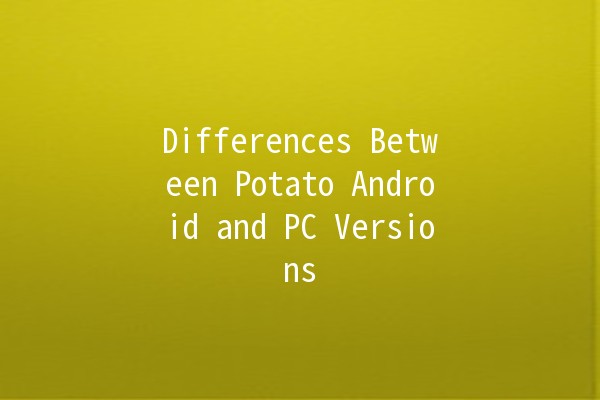The Potato application has gained widespread recognition for its unique features and capabilities, catering to users across different platforms, namely Android and PC. This article delves into the key differences between the Potato Android app and its PC counterpart, providing insights, tips, and practical applications to enhance user productivity.
Understanding the Basics of Potato
Before diving into the differences, it's essential to understand what Potato is. It is an application designed to improve user experience via a sleek interface and innovative features aimed at enhancing productivity. The application serves numerous purposes, including file management, communication, and entertainment, catering to various user needs.

Major Differences Between Potato Android and PC Versions
One of the most prominent differences between the Android and PC versions of Potato lies in the user interface (UI).
Android Version
The Android app is optimized for touch navigation. It features a simplified interface with larger buttons and swipes for easier management on smaller screens.
It includes mobilespecific features, such as notifications through the status bar and easy access to the app through widgets.
PC Version
The PC edition provides a more complex interface designed for keyboard and mouse navigation, featuring multiple windows that can be rearranged as per the user's needs.
It supports the allowance of multitasking due to more extensive screen space, facilitating a more productive environment when managing several tasks simultaneously.
Both versions of Potato have been engineered for top performance; however, there are significant functional distinctions between them.
Android Version
The app is designed with efficiency in mind, minimizing battery consumption while utilizing mobile data smartly.
Certain features may be limited compared to the PC version due to hardware constraints inherent in mobile devices, such as slower processing power and restricted memory capacity.
PC Version
The Potato PC version harnesses the full power of desktop hardware, allowing for faster processing and the ability to handle larger files and more demanding tasks.
It also supports advanced features like file backups on external drives, complex multimedia editing, and seamless integration with other desktop applications.
Different user needs drive the variation in features and tools available within each version of Potato.
Android Version
The mobile version often prioritizes portability, offering essential features such as instant messaging and quick file sharing.
It also emphasizes cloud storage integration, allowing users to access documents on the go seamlessly.
PC Version
The PC version boasts advanced tools for users who require indepth functions such as data analysis, project management tools, and comprehensive file management.
Additionally, it often includes more extensive formatting options and productivity tools such as keyboard shortcuts and multiwindow support.
Accessibility and portability are crucial aspects in today's fastpaced world, significantly influencing user preference.
Android Version
An undeniable advantage of the Android version is its mobility, allowing users to stay connected and productive anywhere, anytime.
The mobile app integrates seamlessly with other mobile services, enhancing the user experience by providing diverse functionalities onthego.
PC Version
While the PC version lacks portability, it often boasts enhanced accessibility features suited for those who spend extended periods on their computers.
It provides an environment conducive to prolonged focus and productivity, often necessary for extensive tasks requiring a larger workspace.
Pricing structures for software applications can significantly impact user choice and usage patterns.
Android Version
The Android app typically follows a freemium model, allowing users to access basic features without charge while offering premium subscriptions for advanced functionality.
This model is attractive for casual users who may not require the full spectrum of features available on the PC.
PC Version
The PC version may adopt a different pricing strategy, often requiring a onetime purchase or a more robust subscription model reflecting its wider array of tools and functionalities.
It caters to professional users or organizations needing comprehensive features, thus justifying a higher price point.
Productivity Enhancement Tips for Potato Users
To maximize the productiveness of using Potato on either platform, here are five practical tips:
Explanation
Keyboard shortcuts can enhance your workflow by reducing reliance on mouse operations, saving valuable time.
Example
Familiarize yourself with shortcuts such as Ctrl + N for creating new documents or Ctrl + S to quickly save your work. This can lead to a significant boost in efficiency.
Explanation
Notifications are vital for staying updated and engaged with realtime changes or communications.
Example
Enable notifications for important apps integrated within Potato on Android, ensuring you never miss crucial updates or deadlines.
Explanation
Implementing a structured organization system can drastically reduce time spent searching for files.
Example
Use folders and tags to categorize documents by project or type, making retrieval quicker and simpler on both versions of Potato.
Explanation
Leverage the cloud storage capabilities to back up essential files and access them from any device.
Example
Use integrated cloud services to ensure that all your important documents are synchronized across the Android and PC applications for quick access when needed.
Explanation
Keeping your app updated ensures that you benefit from the latest features, performance improvements, and security patches.
Example
Regularly check for updates on both platforms to stay current with any new tools or enhancements that can further improve your productivity.
Frequently Asked Questions
Yes, Potato is available as an application on both Android and PC platforms, offering features tailored to each operating system.
Absolutely! Potato provides cloud integration, allowing users to sync data across both platforms seamlessly.
Yes, due to hardware constraints, the Android version may have limited functionality compared to the more robust capabilities of the PC version.
To enhance your experience, utilize mobile notifications for realtime updates, and take advantage of widgets for quick access to essential features.
Yes, Potato usually provides a freemium model, allowing users to explore basic features for free, with premium upgrades available for advanced tools.
The Potato PC version typically requires standard processing and memory capabilities based on your system's capacity. Always check the official guidelines for precise specifications.
By understanding these differences and utilizing the tips provided, users can navigate Potato effectively and enhance their productivity across devices.